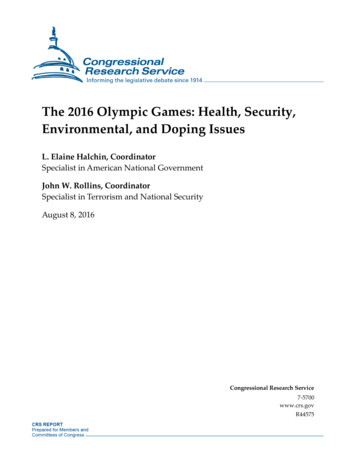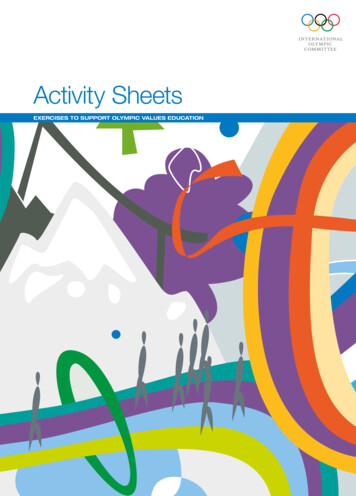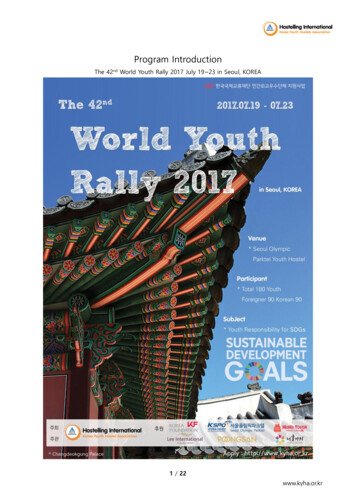
Transcription
The 2016 Olympic Games: Health, Security,Environmental, and Doping IssuesL. Elaine Halchin, CoordinatorSpecialist in American National GovernmentJohn W. Rollins, CoordinatorSpecialist in Terrorism and National SecurityAugust 8, 2016Congressional Research Service7-5700www.crs.govR44575
The 2016 Olympic Games: Health, Security, Environmental, and Doping IssuesSummaryThe 2016 Olympic Games will be held in Rio de Janeiro, Brazil, August 5-21, 2016, and will befollowed by the Paralympic Games, September 7-18, 2016. Notably, these are the first games tobe hosted by a South American city. Reportedly, 10,500 athletes from 206 countries willparticipate in the Olympics, including 555 athletes from the United States. Most Olympic eventswill take place in and around Rio de Janeiro. In addition to Rio de Janeiro, soccer matches will beheld in the cities of Belo Horizonte, Brasília, Manaus, São Paulo, and Salvador.Host countries and cities often have to deal with a variety of questions or issues, which is alsotrue for Brazil and Rio de Janeiro. The list of issues or potential problems that might haveimplications for athletes, team personnel, and spectators participating in or attending the 2016 RioGames includes the Zika virus, public safety threats, security concerns, and environmentalconditions. It also bears noting that the act of hosting the Olympics may have implications forBrazil. Finally, doping is of particular concern this year because of revelations regarding a stateorchestrated doping scheme perpetrated by Russian authorities and sports organizations.Each candidate city for the 2016 Games was required to address 14 themes in its bid, such asenvironment and meteorology, finance, security, medical services, and doping control. However,no one in 2009 could have foreseen the outbreak of the mosquito-borne Zika virus in late 2015,when Brazilian health officials noticed an increase in the number of infants born withmicrocephaly. Although some have called for the Games to be postponed or cancelled, the U.S.Centers for Disease Control and Prevention (CDC) and the World Health Organization (WHO)have indicated the risk of international transmission due to the Olympic and Paralympic Games islow. The CDC has published specific recommendations for pregnant women, and the U.S.Olympic Committee (USOC) has taken steps to safeguard the U.S. Olympic team.In the candidature file it submitted to the International Olympic Committee (IOC), the Rio 2016Organising Committee for the Olympic Games stated that visitors to the country would beprovided free health care. Additionally, Brazil committed to providing medical response teamsand units at Olympic facilities. However, shortages of health care workers and supplies mightcompromise the medical services available.Public safety and security are key concerns for visitors to Brazil, including Olympic competitorsand spectators. The Department of State has noted that crime is a significant threat, and, duringthe 2014 World Cup, thieves targeted visitors near sports venues and other locales frequented bytourists. Although Rio de Janeiro has experienced significant improvement in public safety inrecent years, some criminal activity has increased in the first half of 2016. With respect tosecurity concerns and, specifically, terrorist threats, Brazil’s Director of Counterterrorismreportedly has noted that the threat of terrorism has increased in recent months. In July 2016, theBrazilian police arrested 10 Brazilian nationals suspected of planning an attack during the Games.The national government, which is in charge of security for the Olympic Games, plans to mustera force of 85,000 personnel to provide security. U.S. citizens requiring assistance may reach outto the State Department.Organizers of the Rio 2016 Summer Olympics and Paralympics have made many commitmentsto host Games in which environmental sustainability is integral to design and planning throughimplementation, review, and post-event activities. These commitments address issues such asimpacts of public transportation, construction, and waste management, and needed water qualityimprovements. For some time, concern has focused on pollution of waters at venues that will hostsailing, rowing, triathlon, and similar events, leading to fear that high levels of water pollutioncould harm the health of tourists and athletes, in addition to impacting the competitionsCongressional Research Service
The 2016 Olympic Games: Health, Security, Environmental, and Doping Issuesthemselves. Organizers of the Games acknowledge that commitments related to sanitation andwater quality will not be met before the Games begin.The Brazilian government campaigned hard to win the right to host the 2016 Olympics, viewingthe Games as an opportunity to showcase Brazil’s economic and social progress and reinforce thecountry’s image as a rising power. Brazil’s international stature has generally declined in recentyears, however, as the country has struggled to address deepening economic and political crises.While the Olympics could allow Brazil to highlight its potential and regain some of the prestige itmay have lost in recent years, any problems that emerge are likely to reinforce negativeperceptions some have of the country. The Games are unlikely to have much of an effect onBrazil’s domestic political situation or economy. Nevertheless, a successful Olympics couldstrengthen the current government’s hold on power and provide a temporary boost to Rio deJaneiro’s economy. Most Brazilians are relatively pessimistic about the Olympics and believethey have brought more costs than benefits to the country.While doping is a perennial concern, it has been, and is, of particular concern in the monthsleading up to the 2016 Rio Games. The release of two World Anti-Doping Agency (WADA)reports, in November 2015 and July 2016, has shown that Russian authorities and sportsorganizations engaged in doping schemes involving the Russian track and field team and Russianathletes competing in 2014 at the Winter Games in Sochi, Russia. The latter report also revealed amulti-year operation implicating, among other organizations, the Russian Ministry of Sport. Theconsequences of these reports include, among other actions and decisions taken by theappropriate international sports organizations, a ban on Russia’s track and field team, whichmeans the team will not be allowed to participate in the 2016 Games. Additionally, theInternational Olympic Committee (IOC) stated that the presumption of innocence does not applyto Russian athletes and established conditions other Russian athletes must meet to demonstratethey have clean doping records and thus be eligible to compete in Rio de Janeiro.Congressional Research Service
The 2016 Olympic Games: Health, Security, Environmental, and Doping IssuesContentsIntroduction . 1Overview . 3The Zika Virus Outbreak . 5Background . 5A Proposal to Postpone or Cancel the Games . 6Protections for U.S. Travelers and Athletes . 6Protections for Pregnant Women . 7Brazilian Health Services for Olympians and Visitors . 8Public Safety and Security During the Games . 9Public Safety Concerns . 9Security Concerns . 11Terrorist Incidents in Past Olympics . 11The Terrorist Threat to the Rio Games . 11Brazil’s Security Preparations for the Games . 12U.S. Citizens Requiring Assistance . 12Environmental Concerns . 13Background: Environmental Commitments for the Olympics Games . 13Water Quality Issues . 15Implementing the Environmental Commitments . 17Health Implications for Athletes . 17Environmental Legacy of Hosting the Olympics . 19Implications of the Olympics for Brazil . 20Doping . 22The Russian Athletics Federation and Doping . 242014 Sochi Winter Olympics and Doping. 26Ramifications of the IC Report and IP Report . 27Russian Athletes . 27Other Athletes . 28Re-testing of Samples from Previous Summer Olympics . 29Other Athletes’ Concerns . 30Protecting Clean Athletes Post-2016 Rio Games . 31FiguresFigure 1. Olympic Venues within Rio de Janeiro . 2Figure 2. Olympic Venues for Soccer . 2Figure 3. Rio2016TM Water Venue Locations . 16AppendixesAppendix. Anti-Doping Acronyms . 33Congressional Research Service
The 2016 Olympic Games: Health, Security, Environmental, and Doping IssuesContactsAuthor Contact Information . 33Key Policy Staff . 34Congressional Research Service
The 2016 Olympic Games: Health, Security, Environmental, and Doping IssuesIntroductionJacques Rogge, President of the International Olympic Committee (IOC), announced on October2, 2009, that Rio de Janeiro, Brazil, had been selected to host the Games of the XXXI Olympiadin 2016.1 The selection of Rio de Janeiro to host the 2016 games marks the first time a SouthAmerican city has been selected to host an Olympics. Rio de Janeiro was an applicant city for the2012 Summer Olympics.2 Rio de Janeiro does have experience hosting major internationalsporting events, however. The city hosted the 2007 Pan-American Games and the 2014Fédération Internationale de Football Association (FIFA) World Cup.The Olympic Games will be held August 5-21, 2016.3 It is expected that 10,500 athletes from 206countries will participate in 42 sports, including 555 athletes on the U.S. Olympic team.4 Mostevents will be held at 32 competition venues in 4 main regions, or neighborhoods, in Rio deJaneiro: Barra de Tijuca (Barra), Copacabana, Deodoro, and Maracanã.5 Figure 1 below showsthe four neighborhoods and the specific venues located in each.In addition to Rio de Janeiro (which has two soccer stadiums), soccer matches will be held in thecities of Belo Horizonte, Brasília, Manaus, São Paulo, and Salvador. Figure 2 below shows all sixcities.For the first time, the 2016 Rio Games will feature a team consisting of athletes who are refugees.Created by the IOC’s Executive Board, the Refugee Olympic Team (ROT) for the 2016 SummerGames has 10 members who were selected from a pool of 43 athletes. The origin countries of theROT athletes are the Democratic Republic of the Congo (2), Ethiopia (1), South Sudan (5), andSyria (2). The IOC will ensure that the ROT receives uniforms, housing, and technical assistance(e.g., coaches and support staff). The Olympic flag and the Olympic anthem will be used for anyofficial representations, such as possible medal ceremonies, involving ROT.61In addition to Rio de Janeiro, Baku, Azerbaijan; Chicago; Doha, Qatar; Madrid, Spain; Prague, Czech Republic; andTokyo, Japan had submitted applications to the IOC to host the 2016 games. The IOC’s Executive Board acceptedChicago, Madrid, Rio de Janeiro, and Tokyo as candidate cities. International Olympic Committee, “2016 Host CityElection,” at nternational Olympic Committee, “2012 Host City Election,” at -city-election/.3The Paralympic Games will be held in Rio September 7-18, 2016.4U.S. Olympic Committee, “U.S. Olympic Committee Announces 555-Member 2016 U.S. Olympic Team”, July 23,2016, at am. Two sports—golf and rugby—return to the Olympics in Rio de Janeiro. IOC members voted onOctober 9, 2009, to readmit these two sports to the Olympic program. Previously, golf was included in the Olympicprogram in Paris (1900) and St. Louis (1904), and rugby was included in Paris (1904 and 1924), London (1908), andAntwerp (1920). In these four previous Olympics, each rugby team had 15 players. The Rio Olympics will have thesport “Rugby sevens,” which means each team has seven players. International Olympic Committee, “Golf Poised toMake Long Awaited Return,” March 29, 2016, at ng-awaitedreturn/248930; International Olympic Committee, “Golf and Rugby – New Kids on the Block,” March 17, 2016, ids-on-the-block/248877.5Rio 2016 Organising Committee for the Olympic Games, “Olympic Games,” at nal Olympic Committee, “Refugee Olympic Team to Shine Spotlight on Worldwide Refugee Crisis,” June3, 2016, at gressional Research Service1
The 2016 Olympic Games: Health, Security, Environmental, and Doping IssuesFigure 1. Olympic Venues within Rio de Janeiro2016 Rio GamesSource: Created by the Congressional Research Service using data from the U.S. Olympic Committee and ESRI.Figure 2. Olympic Venues for Soccer2016 Rio GamesSource: Created by the Congressional Research Service using data from the U.S. Olympic Committee and ESRI.Congressional Research Service2
The 2016 Olympic Games: Health, Security, Environmental, and Doping IssuesOverviewOver the years, host countries and cities have had to deal with a variety of concerns, problems, orcriticisms, and Rio de Janeiro is no exception. Separately or collectively, a variety of issues mightpose risks to the health, safety, and general well-being of athletes and their families, teampersonnel, and spectators participating in or attending the 2016 Games. Chief among these are theZika virus, public safety threats, security concerns, and environmental conditions. This report alsodiscusses the possible implications of hosting the Olympics for Brazil and the issue of doping.Each candidate city for the 2016 Games was required to address 14 themes in its bid—such asenvironment and meteorology, finance, security, medical services, and doping control. However,in 2009 no one could have foreseen the outbreak of the mosquito-borne Zika virus in 2016. TheU.S. Olympic Committee (USOC) has stated publicly that the decision to participate in the 2016Games is up to each member of the U.S. Olympic team, which will include approximately 550athletes.7 In March 2016, the USOC announced that it had recently established an InfectiousDisease Advisory Group consisting of three physicians who are infectious disease experts andwho have experience managing “infectious disease in patient populations that frequently travelinternationally.”8 The advisory group is to assist the USOC by establishing best practices for “themitigation, assessment and management of infectious disease. ”9 Other steps taken, or planned,by the USOC include making information available to athletes and the public via the Internet10and providing Team USA athletes with mosquito netting, bug repellent, and informationalmaterials.11The Rio 2016 Organising Committee for the Olympic Games described, in the candidature file itsubmitted to the IOC, the exiting health care resources that could be used in support of the Gamesand committed to providing a series of Games-specific health services.12 However, shortages ofhealth care workers and supplies might compromise the medical services available.Public safety is also a key concern, given the prevalence of criminal activity in and around Rio deJaneiro.13 More recently, as reported by the Wall Street Journal, criminals stole a truck loadedwith broadcasting equipment for the Games, and athletes training in Rio de Janeiro have beenrobbed on the street.14 Although it does not mention the Olympics specifically, the StateDepartment’s information page for travelers to Brazil cautions that the city of Rio de Janeirocontinues to “experience high incidences of crime, including armed robberies. Tourists areparticularly vulnerable to street thefts and robberies in the evening and at night especially in areas7Karen Rosen, “Team USA Leadership on Zika: ‘Our Main Emphasis is Communicate and Educate’,” news release,March 7, 2016, at e-And-Educate.8U.S. Olympic Committee, “U.S. Olympic Committee Creates Infectious Disease Advisory Group,” March 4, 2016, -Group.9Ibid.10The website is available at http://www.teamusa.org/Rio-Travel-Updates.11Karen Rosen, “Team USA Leadership on Zika: ‘Our Main Emphasis is Communicate and Educate.’”12Rio 2016 Organising Committee for the Olympic Games, Candidature File for Rio de Janeiro to Host the 2016Olympic and Paralympic Games, 2009, Vol. 3, n.p.13U.S. Department of State, Bureau of Diplomatic Security, Overseas Security Advisory Council, Brazil 2016 Crime 7Safety Report: Rio de Janeiro, at px?cid 19071.14Paul Kiernan and Will Connors, “Truck Carrying Broadcast Equipment for Olympics Hijacked in Rio,” Wall StreetJournal, July 1, 2016.Congressional Research Service3
The 2016 Olympic Games: Health, Security, Environmental, and Doping Issuesadjacent to major tourist attractions.”15 However, U.S. Olympic Committee (USOC) officialsreportedly have stated that “the athletes’ and competition venues would be ‘the safest place in theworld’” and U.S. “‘athletes will be among the safest people in Rio, just because of all the securitythere’s going to be.’”16The September 11, 2001, terrorist attacks in the United States and recent attacks in Belgium,France, and the United States have heightened concerns that the Olympics could be targeted byterrorists. As reported by the Washington Post, Brazil is revising its security plans for the Gamesin the wake of the incident in Nice, France, in July 2016.17 On the other hand, the Wall StreetJournal reported that a contract for providing screeners who will staff security checkpoints wasnot awarded until July 1, 2016, and the company awarded the contract is “a small employmentoutsourcing firm.”18Hosting the Olympic Games and Paralympic Games may have implications for Brazil that extendbeyond the actual events. Although the Brazilian government viewed hosting the Olympics as anopportunity to showcase the country’s progress, its international stature has generally declined inrecent years and Olympics-related problems that have emerged, or may emerge, could adverselyaffect the country’s standing. For example, as countries’ Olympic teams began moving into theOlympic Village in July, they discovered a variety of infrastructure problems. At least onecountry’s delegation chose to stay in a hotel while the plumbing, electricity, and gas problemswere fixed.19 Additionally, the backdrop to the Olympics is a country beset by political andeconomic issues.Although a host country may anticipate that being selected to stage the Games will enhance itsstanding in the world, serve as a catalyst for ameliorating (for example) environmental issues, orprompt economic development, hosting the Games may fall short of the Rio 2016 OrganisingCommittee for the Olympic Games’ (Rio Organising Committee or Rio2016 ) goals orexacerbate existing problems or issues. If Brazil’s efforts are successful, the country may regainsome of the prestige it may have lost in recent years, and, turning to politics, a successful Gamesmight improve the standing of the interim president. While the city of Rio de Janeiro may benefitfrom infrastructure improvements, it is unclear how hosting the Games might affect the country(including the city and state of Rio de Janeiro) financially.Of particular to concern to athletes who compete in open water events, such as sailing androwing, is the quality of the water where those events will take place. Although the Rio 2016Organising Committee for the Olympic Games (Rio Organising Committee or Rio2016 ) hadcommitted, for example, to ensuring to improve the quality of the water at the venue forcanoeing, kayaking, and rowing events,20 the efforts apparently have fallen short. As reported by15U.S. Department of State, “Brazil,” at try/brazil.html.Dave Sheinin, “USOC Organizers Downplay Concerns over Zika, Security Heading into Rio Games,” WashingtonPost, at 6-a66f-aa6c1883b6b1 story.html.17Dom Phillips, “Brazil Beefs Up Olympic Security after Nice Terror Attacks,” Washington Post, July 16,2016, at https://www.washingtonpost.com/world/the -0c6e4accc5b1 story.html18Will Connors, “Brazil Moves Late on Olympics Security—Small, Inexperienced Company Was Given Contract forScreening Only Two Weeks Ago,” Wall Street Journal, June 18, 2016.19Vinod Sreeharsha, “At Athletes’ Village, a Nonstop Effort to Stem Flow of Complaints,” New York Times, July 26,2016, at nts.html?ref sports.20Rio 2016 Organising Committee for the Olympic Games, Candidature File for Rio de Janeiro to Host the 2016(continued.)16Congressional Research Service4
The 2016 Olympic Games: Health, Security, Environmental, and Doping IssuesESPN.com in early 2016, a USOC memorandum on water quality read, in part, that “The IOC andRio Organizing Committee recognize that the water quality in and around Rio is for the most partnot at an acceptable level and there [are] significant fluctuations in the bacterial and viralcontaminants at the competition venues.”21 Precautions taken by the U.S. rowing team includewearing a training suit that has anti-microbial properties.22Doping, which is a perennial concern, has taken on added importance in the year leading up to theRio Games because of revelations regarding Russia’s national governing body (NGB) for trackand field. Publication of a World Anti-Doping Agency-commissioned report in November 2015revealed that individuals and sports organizations in Russia had engaged in an orchestrateddoping scheme involving track and field athletes. A second WADA report, released in July 2016,documents Russian doping practices during the 2014 Sochi Winter Olympics and a multi-yeardoping methodology that involved the Russian Ministry of Sport. While the relevant internationalorganizations, such as the World Anti-Doping Agency (WADA), denounced the doping schemesand practices and used their respective authorities to sanction individuals and organizationsinvolved, lingering questions remain regarding, in particular, other Russian Olympic athletes andteams.The Zika Virus Outbreak23BackgroundIn late 2015, health officials in Brazil saw a spike in the number of infants born withmicrocephaly, a birth defect that may accompany significant, permanent brain damage. Theincrease in microcephaly was later linked to prenatal infection with the Zika virus, which appearsto have arrived in Brazil early in 2015. Between October 2015 and July 2016, more than 1,600cases of Zika-related microcephaly and other congenital malformations of the central nervoussystem have been reported among newborns in Brazil.24Zika virus is transmitted through the bite of an infected mosquito, or through sexual transmissionor blood transfusion from an infected person. No vaccine or specific treatment is available. MostZika infections are mild. However, rare but serious neurologic disorders may occur in anyonewho is infected, and the risk of fetal abnormalities among infected pregnant women may be ashigh as 13%.25(.continued)Olympic and Paralympic Games, 2009, Vol. 1, p. 97.21Bonnie D. Ford, “USOC Started Plans for Dealing with Rio Water Issues in 2015, According to Memo,” ESPN.com,February 19, 2016, at http://espn.go.com/olympics/story/ 2015rio-olympic-games.22Associated Press, “U.S. Rowers Get Antimicrobial Training Suits for Rio Games”, June 26, 2016, athttp://espn.go.com/olympics/rowing/story/ g-suits-rio-games;23Prepared by Sarah A. Lister, Specialist in Public Health and Epidemioology, and Grant D. Clinkingbeard, ResearchAssociate.24Pan American Health Organization “Regional Zika Epidemiological Update (Americas),” July 7, 2016, athttp://www.paho.org/hq/index.php?option com content&view article&id 11599&Itemid 41691&lang en. For moreinformation about the Zika outbreak in Brazil, see CRS Report R44545, Zika Virus in Latin America and theCaribbean: U.S. Policy Considerations, coordinated by Clare Ribando Seelke.25Michael A. Johansson, et al., “Zika and the Risk of Microcephaly,” New England Journal of Medicine, vol. 375, July7, 2016. See also CDC, “Questions and Answers for Healthcare Providers Caring for Pregnant Women and Women of(continued.)Congressional Research Service5
The 2016 Olympic Games: Health, Security, Environmental, and Doping IssuesA Proposal to Postpone or Cancel the GamesSome have voiced concerns that the travel of thousands of tourists and athletes to the Olympicand Paralympic Games and back to their homes could enhance the regional and global spread ofthe Zika virus. For some time, Brazilian officials have sought to assuage these concerns by notingthat the Games will take place during the dry winter season in Brazil, when fewer mosquitoes arepresent, and that the venues and hotel areas will be regularly fumigated.26 However, in May 2016,150 health experts and bioethicists wrote an open letter to WHO Director-General Dr. MargaretChan urging her to recommend postponing or relocating the Games.27 The letter citesuncertainties surrounding the emergence of the Zika virus in the Americas, and the severity of theneurologic injuries Zika infection can cause. The letter also states that a long-standing partnershipbetween WHO and the International Olympic Committee (IOC) presents a conflict of interest thatcompromises WHO’s ability to render a neutral opinion on public health in this situation.The World Health Organization (WHO) reaffirmed its support of the Games in June 2016,following the third meeting of a WHO Emergency Committee convened to study the Zikaoutbreak and the means to contain it. As it had before, the WHO committee determined that “ .there is a very low risk of further international spread of Zika virus as a result of the Olympic andParalympic Games . ,” and it did not recommend postponing, cancelling, or relocating theGames.28 In July 2016, researchers at the U.S. Centers for Disease Control and Prevention (CDC)and their collaborators published a model of the contribution of the Olympics to the internationalspread of the Zika virus. The model found this contribution to be negligible except for fourcou
Centers for Disease Control and Prevention (CDC) and the World Health Organization (WHO) have indicated the risk of international transmission due to the Olympic and Paralympic Games is low. The CDC has published specific recommendations for pregnant women, and the U.S. Olympic Committee (USOC) has taken steps to safeguard the U.S. Olympic team.









